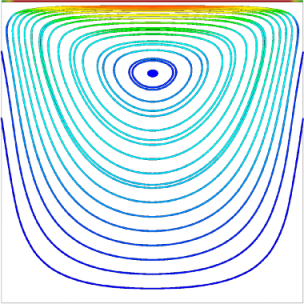Courses by Software
Courses by Semester
Courses by Domain
Tool-focused Courses
Machine learning
POPULAR COURSES
Success Stories
Job Trends In The CFD (Computational Fluid Dynamics) Industry
New engineering methodologies must be implemented in the development phase with the ever-evolving need for sophisticated and durable products. The principles of applied physics to analyse the CAD models can enable engineers to arrive at the best possible solutions.
Job Trends In The CFD (Computational Fluid Dynamics) Industry

New engineering methodologies must be implemented in the development phase with the ever-evolving need for sophisticated and durable products. The principles of applied physics to analyse the CAD models can enable engineers to arrive at the best possible solutions. The structural analysis alone is insufficient to determine a structure's stability.
It is essential to understand the nature and effects of fluid flow. CFD technology is a science that uses numerical methods to solve flow-related problems. By performing the CFD analysis, engineers can develop accurate prototypes with less cost and time. The automobile, aerospace, HVAC, and many other industries use this technology to validate CAD design.
Computational Fluid Mechanics is a branch of Computer-Aided Engineering in which the 2D/3D models are simulated for fluid flow. The advanced tools used for performing CFD analysis can accurately predict the fluid flow and allow organisations to determine the system's efficiency without creating a physical prototype. This method helps organisations reduce the time to develop a new product. The size of the computational fluid dynamics market was estimated at USD 2120.3 million in 2021 and is anticipated to grow at a CAGR of 9.64%.
Types of Computational Fluid Dynamics Courses

Top OEMs are constantly finding ways to improve their products' quality cost-effectively. Prospective employers prefer candidates with advanced certification courses in computational fluid dynamics who can become an asset to the organisation from day one of their work.
Below are the three popular types of courses for CFD training
CFD Analysis Training By Colleges/Universities
CFD is one of the most important sub-domain of mechanical engineering. The traditional college curriculum is not sufficient to master the technical concepts in this domain. The NPTEL website also provides a free CFD course without certification, an initiative by prestigious universities IITs and IISc. Nonetheless, the certification can be obtained for INR 1,000/course with an examination.
CAE Online Course By EdTech Companies
Skill-Lync provides a one-of-its-kind of course in the CFD to provide industry-relevant training to aspiring engineers. To ace the most in-demand skills, our Post Graduate Program in Computational Fluid Dynamics is an ideal choice. For those who are interested in stepping into the R&D sector of manufacturing industries, pursuing a course in this domain can help you.
We offer an NSDC-accredited CFD online course through which aspirants can build expertise in CFD tools and become eligible for high-paying jobs at top OEMs.
CFD Training Through Internships
The job market for engineers is highly competitive, and hirers are looking for candidates who have industrial exposure. Internships are one of the best methods to gain experience and practical knowledge. Strong theoretical knowledge with hands-on practice can make you an ideal fit in the dynamic job market. Skill-lync provides advanced CFD analysis courses with internship opportunities for eligible candidates. You can use our platform to kick-start your lucrative career in the CFD domain.
Specialisations in Computational Fluid Dynamics Courses

Skill-Lync has tailor-made a curriculum for online CFD courses that can impart theoretical and practical knowledge to mechanical engineers. Our popular Post Graduate Program in Computational Fluid Dynamics entails the following courses.
- Advanced CFD for IC Engine Applications using CONVERGE
- Turbulence and RANS Modelling
- Advanced Aerodynamic Simulations using CONVERGE
- Introduction to CFD using MATLAB and OpenFOAM
Advanced CFD for IC Engine Applications using CONVERGE
Knowledge of CFD technology is very crucial for the development of modern engines for automobiles. This IC engine course will cover all the essential concepts needed for a CFD engineer. It especially focuses on the concepts involved in turbulence, combustion and emission modelling and IC engine fundamentals.
Turbulence and RANS Modelling
Most of the flows that engineers encounter are turbulent. It is important to understand the characteristics of these fluids. This turbulence modelling for CFD course specially focuses on the concepts of turbulence models, RANS: k-epsilon, k-omega and industrial CFD applications.
Advanced Aerodynamic Simulations using CONVERGE
CONVERGE is one of the most powerful tools used for performing CFD analysis. Our industry experts will teach you how to perform simulations using CONVERGE in this aerodynamic simulation course. The turbulence training program will equip you with the skills required to analyse the flow over the FSAE Racing Car.
Introduction to CFD using MATLAB and OpenFOAM
The manufacturing industries are in demand to mass produce the products and engineering components. By taking up this MATLAB and Simulink training, you can develop scripts for automating the CFD process. Toward the end of this specialised MATLAB course, you will be capable of automating BlockMesh generation for meshing pipe geometry.
Cost and Duration of CAE Certification Courses
The cost of the CFD course at Skill-Lync varies depending on the curriculum and program duration.
The fee structure of this CFD certification course has been divided into three categories: basic, pro, and premium.
Investing your time and money to acquire advanced skill sets can prepare you for a lucrative career. Through this Computer-Aided Engineering course, one can get ready for the following jobs:
Job Opportunities After CFD Certification Courses:
- ANSYS Developer-Fresher
- CAE Engineer-CFD
- Simulation Engineer
- CFD Analyst
- CFD Modeler
- Aero CFD Engineer
Higher Education After CFD Training
In a rapidly growing tech landscape, continual learning and skill development are recommended. Those who are interested in higher education after CFD certification courses can easily consider the following post-graduate programmes:
Select a domain
I agree to Skill-Lync terms & conditions and privacy policy.
Related Courses





Skill-Lync offers industry relevant advanced engineering courses for engineering students by partnering with industry experts.
Our Company
4th Floor, BLOCK-B, Velachery - Tambaram Main Rd, Ram Nagar South, Madipakkam, Chennai, Tamil Nadu 600042.
Top Individual Courses
Top PG Programs
Skill-Lync Plus
Trending Blogs
© 2025 Skill-Lync Inc. All Rights Reserved.







